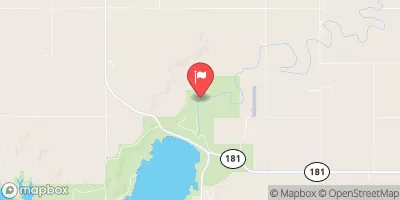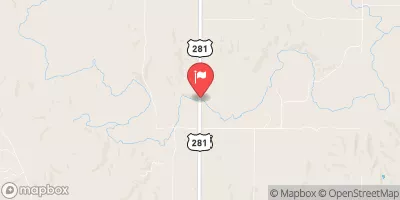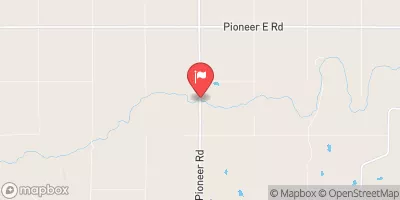Wilson Lk Nr Wilson Reservoir Report
Last Updated: February 22, 2026
Wilson Lake is a reservoir located in the central part of Kansas, near the town of Wilson.
Summary
The lake was created in 1964 by the U.S. Army Corps of Engineers as a flood control and water supply project. It is fed by several small streams and has a capacity of 155,000 acre-feet. The lake has a surface area of 9,000 acres and is popular for fishing, boating, and water sports. The lake is also a habitat for several species of fish, including walleye, crappie, and catfish. The surrounding land is used primarily for agriculture, including wheat, corn, and soybeans. The lake and its surrounding area are also popular for hunting and camping. The lake is managed by the U.S. Army Corps of Engineers and is part of the Kansas River Basin.
°F
°F
mph
Wind
%
Humidity
15-Day Weather Outlook
Reservoir Details
| Lake Or Reservoir Water Surface Elevation Above Ngvd 1929, Ft 24hr Change | 0.0% |
| Percent of Normal | 100% |
| Minimum |
1,505.46 ft
2016-04-16 |
| Maximum |
1,527.08 ft
2019-06-12 |
| Average | 1,513 ft |
| Hydraulic_Height | 130 |
| Drainage_Area | 1917 |
| Year_Completed | 1964 |
| Nid_Storage | 736000 |
| Structural_Height | 160 |
| River_Or_Stream | SALINE RIVER |
| Foundations | Rock, Soil |
| Surface_Area | 9040 |
| Hazard_Potential | High |
| Outlet_Gates | Uncontrolled - 0 |
| Dam_Length | 5600 |
| Primary_Dam_Type | Earth |
| Nid_Height | 160 |
Seasonal Comparison
Reservoir Storage, Acre-Ft Levels
Lake Or Reservoir Water Surface Elevation Above Ngvd 1929, Ft Levels
5-Day Hourly Forecast Detail
Nearby Streamflow Levels
 Saline R At Wilson Dam
Saline R At Wilson Dam
|
5cfs |
 Saline R Nr Russell
Saline R Nr Russell
|
16cfs |
 Smoky Hill R Nr Bunker Hill
Smoky Hill R Nr Bunker Hill
|
58cfs |
 Paradise C Nr Paradise
Paradise C Nr Paradise
|
0cfs |
 Smoky Hill R At Ellsworth
Smoky Hill R At Ellsworth
|
35cfs |
 Smoky Hill R Nr Russell
Smoky Hill R Nr Russell
|
12cfs |
Dam Data Reference
Condition Assessment
SatisfactoryNo existing or potential dam safety deficiencies are recognized. Acceptable performance is expected under all loading conditions (static, hydrologic, seismic) in accordance with the minimum applicable state or federal regulatory criteria or tolerable risk guidelines.
Fair
No existing dam safety deficiencies are recognized for normal operating conditions. Rare or extreme hydrologic and/or seismic events may result in a dam safety deficiency. Risk may be in the range to take further action. Note: Rare or extreme event is defined by the regulatory agency based on their minimum
Poor A dam safety deficiency is recognized for normal operating conditions which may realistically occur. Remedial action is necessary. POOR may also be used when uncertainties exist as to critical analysis parameters which identify a potential dam safety deficiency. Investigations and studies are necessary.
Unsatisfactory
A dam safety deficiency is recognized that requires immediate or emergency remedial action for problem resolution.
Not Rated
The dam has not been inspected, is not under state or federal jurisdiction, or has been inspected but, for whatever reason, has not been rated.
Not Available
Dams for which the condition assessment is restricted to approved government users.
Hazard Potential Classification
HighDams assigned the high hazard potential classification are those where failure or mis-operation will probably cause loss of human life.
Significant
Dams assigned the significant hazard potential classification are those dams where failure or mis-operation results in no probable loss of human life but can cause economic loss, environment damage, disruption of lifeline facilities, or impact other concerns. Significant hazard potential classification dams are often located in predominantly rural or agricultural areas but could be in areas with population and significant infrastructure.
Low
Dams assigned the low hazard potential classification are those where failure or mis-operation results in no probable loss of human life and low economic and/or environmental losses. Losses are principally limited to the owner's property.
Undetermined
Dams for which a downstream hazard potential has not been designated or is not provided.
Not Available
Dams for which the downstream hazard potential is restricted to approved government users.
Area Campgrounds
| Location | Reservations | Toilets |
|---|---|---|
 Lucas - Wilson Reservoir
Lucas - Wilson Reservoir
|
||
 Sylvan - Wilson Reservoir
Sylvan - Wilson Reservoir
|
||
 Minooka - Wilson Reservoir
Minooka - Wilson Reservoir
|

 Wilson Dam
Wilson Dam
 Wilson Lk Nr Wilson
Wilson Lk Nr Wilson